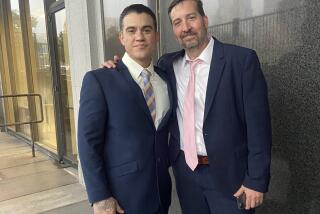Court Upholds Murder Conviction of Ex-LAPD Officer
- Share via
A California appellate court upheld the murder conviction of former Los Angeles Police Officer Robert Von Villas on Thursday, despite agreeing that there was juror misconduct during his trial for the contract killing of a San Fernando Valley businessman.
In a 2-1 ruling, the 2nd District Court of Appeal said that although a juror violated the trial judge’s order by looking at a newspaper article about the conviction of Von Villas’ accomplice, she was not biased.
An attorney for Von Villas said he would appeal the decision to the state Supreme Court.
Von Villas and Richard Ford, a former LAPD detective who served with him in the Devonshire Division, were convicted in separate trials in 1988 of the first-degree murder of Thomas Weed. Prosecutors said the two officers were hired by Weed’s ex-wife, Janie E. Ogilvie, in 1983 to kill Weed for $20,000. Ogilvie was allowed to plead guilty to second-degree murder in exchange for her testimony, and she received a 15-year prison sentence.
They were convicted of the murder although Weed’s body was never found. Both were sentenced to life in state prison without the possibility of parole.
But one juror in the Von Villas trial, Betty Cornick, admitted that she had glimpsed a newspaper headline about Ford’s conviction during the trial. She said she did not read the article.
She said the glimpse, which she did not admit to when originally questioned by the trial judge, did not influence her vote to convict Von Villas.
The appellate court agreed. “The extraneous information judged objectively was not inherently and substantially likely to have influenced the juror,” wrote Justice P. J. Lillie in the majority opinion. “The case against Ford was different from the case against Von Villas and the court had instructed the jury that they were two separate trials.”
Von Villas attorney Russell Iungerich said the ruling subverts the purpose of the original trial arrangement.
“They had two separate juries, and one wasn’t supposed to know what the other was doing,” he said. “That’s going to be a totally useless rule if one finds out what the other is doing and you say, ‘No harm, no foul.’ ”
More to Read
Sign up for Essential California
The most important California stories and recommendations in your inbox every morning.
You may occasionally receive promotional content from the Los Angeles Times.





![Vista, California-Apri 2, 2025-Hours after undergoing dental surgery a 9-year-old girl was found unresponsive in her home, officials are investigating what caused her death. On March 18, Silvanna Moreno was placed under anesthesia for a dental surgery at Dreamtime Dentistry, a dental facility that "strive[s] to be the premier office for sedation dentistry in Vitsa, CA. (Google Maps)](https://ca-times.brightspotcdn.com/dims4/default/07a58b2/2147483647/strip/true/crop/2016x1344+29+0/resize/840x560!/quality/75/?url=https%3A%2F%2Fcalifornia-times-brightspot.s3.amazonaws.com%2F78%2Ffd%2F9bbf9b62489fa209f9c67df2e472%2Fla-me-dreamtime-dentist-01.jpg)







